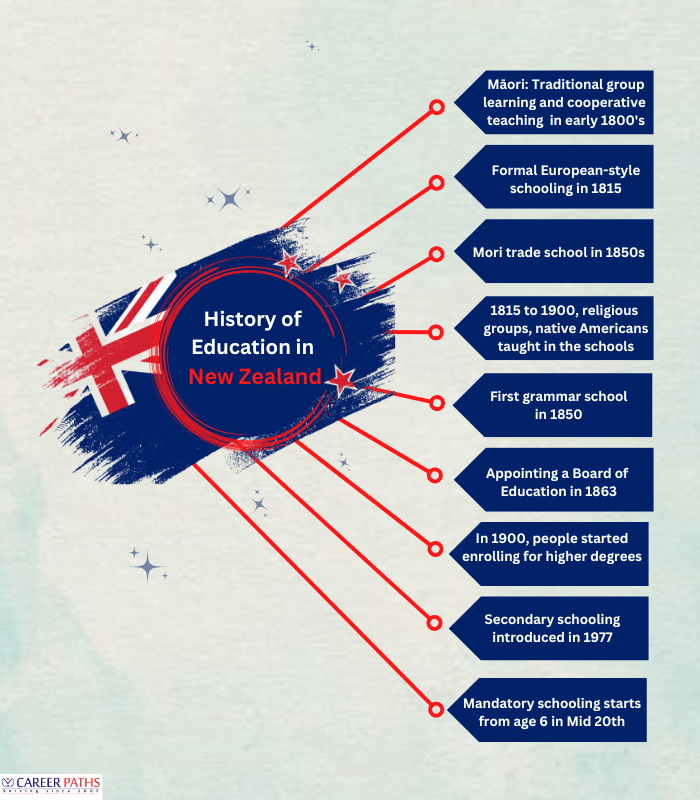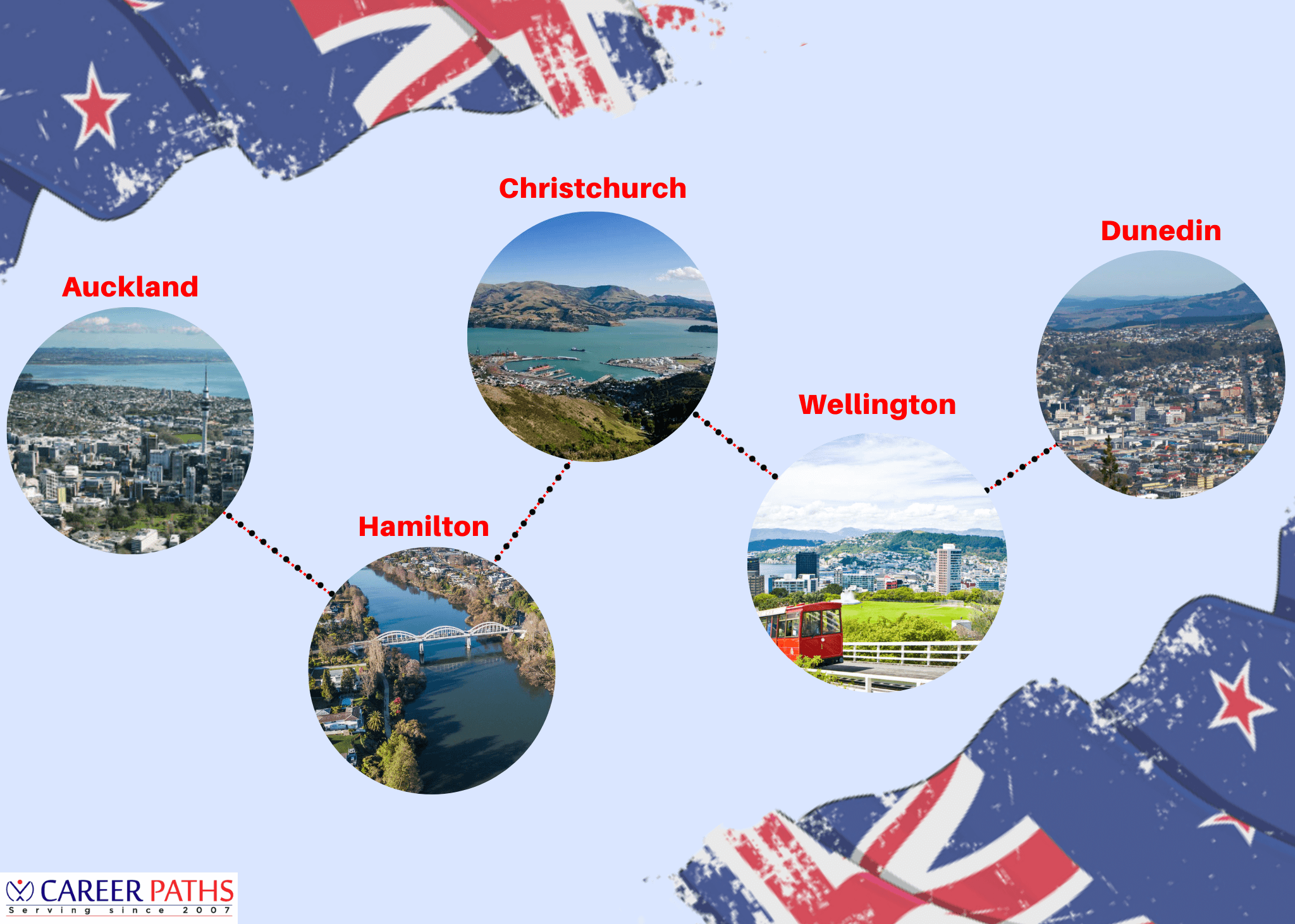
Island nation New Zealand, is located in the western Pacific Ocean. New Zealand is well known for its exceptional international education system, in addition to having a liberal government, a high standard of living, safety and security, and beautiful scenery. While living in a safe country, international students can discover a new culture in New Zealand.
The New Zealand government mandates primary and secondary schooling for children aged 6 to 16. The educational system in New Zealand is divided into three levels. They are Primary and intermediate schools, followed by secondary schools and tertiary education, which includes higher education.
When it comes to foreign degrees, New Zealand is in high demand. On the global education ranking, it consistently has a high position.
History of Education in New Zealand
Before European settlers came, there was Māori education. The indigenous Polynesian people of mainland New Zealand, established educational institutions to teach traditional information such as songs, chants, tribe history, spiritual awareness, and knowledge of medicinal plants. It was group learning and cooperative teaching.
Formal European-style schooling was first introduced in 1815. Later, schooling was well established in 1832 by the London Missionary Society missionaries. During that time, teaching was available in the Māori language. For a long time, the Bible was the only literary work used in the classroom. In the 1850s, a Mori trade school was founded to teach farming skills.
Between 1815 and 1900, religious groups and native Americans were taught in the schools.
Later, two Mori Party MPs supported encouraging Mori students to learn English. They also teach hygiene to lower illness and mortality rates among the Mori people.

Due to the lack of a national education system, grammar schools and other private institutions were the first significant secondary education providers. In 1850, the Auckland Grammar School, the first grammar school in New Zealand, was formed. In 1868, the Auckland Grammar School Appropriation Act was formed. Schools were built by both provincial governments and religious organizations.
The education system was established in northern provinces in 1857 under the authority of the Education Act. It had 45 schools by 1863. The Canterbury Provincial Council passed its first Educational Ordinance in 1857 and appointed a Board of Education in 1863. They had 84 school districts by 1873.
Following the abolition of the provinces in November 1876, New Zealand formed a free, compulsory, and secular national state education system in 1878.
Māori-medium education still exists in New Zealand. Later, the New Zealand education system went through some drastic changes and there were significant changes.
Throughout time Kiwi education developed and improved immensely.
Secondary schooling wasn’t covered in the previous acts. Hence, according to the 1977 Education Act, several secondary schools were introduced.
This degree of knowledge was typically reserved for the rich elite in 1900. There were several styles of secondary education introduced in the early 20th century. It included technical high schools. In the middle of the 20th century, the compulsory school starting age was lowered from 7 years to 6 years in 1964. This level of education was reserved for the rich elite in 1900 who wished to attend college or pursue professional occupations.
Education Levels in New Zealand
The Kiwi culture is distinctive and diverse. There are people with various skills, religious convictions, ethnicities, socioeconomic statuses, and teaching and learning philosophies. The educational system and history reflect the same. New Zealand’s economy greatly benefits from international education. It has three tiers in its educational system.
There are three divisions of education: Early childhood education, Primary and secondary education, and further education which includes higher and vocational education.
Early Childhood Education
The New Zealand government highly encourages early childhood education. Children who learn early tend to be more attentive in their primary and secondary education. Most children start their early childhood education from age 2 to 5. After they are 5 years old, they will be directly admitted to primary and secondary education. Although Early Childhood Education or pre-elementary education is not compulsory by the government, approximately 96.8% of parents in New Zealand admitted their children to attend early childhood education.
There are different kinds of early childhood education institutes available in the education system of New Zealand. Kindergartens, Education and care services, Home-based education and care, and Parent-led services are some of them.
Primary and Secondary Education
The second level of education in New Zealand consists of primary and secondary schooling.
In New Zealand, a citizen or a permanent resident child’s education in state schools is free from the ages of 5 to 19. The government has mandated that children from ages 6 through 16 must attend school.
The level of education in New Zealand is known as Year. There are 13 Year levels in the schooling system of New Zealand. The primary education of your child begins from Year 1 to Year 8 which is around 5–12 years old. On the other hand, the secondary education of Kiwi children starts from Year 9 to Year 13. which is around 13–17 years old.
There are different kinds of Primary and secondary education institutes available in the education system of New Zealand. Local schools, State, state-integrated and private schools, Māori-medium education, National Curriculum, and National Certificate of Educational Achievement (NCEA) are some of them.
Further Education
In New Zealand, tertiary or higher education is taught in universities, institutes of technology, polytechnics, private training facilities, industrial training organizations, and Mori education centers. Further education is from undergraduate degrees to doctorate degrees based on programs.
All university instruction was centralized under the University of New Zealand until 1961, with university colleges spread out around the nation. Over time, the colleges evolved into universities in their own right that grant degrees.
Language in New Zealand
More than 95% of Kiwi people speak English as their first language. They have a unique accent which is called New Zealand English. Māori now exists as a community language as after World War ll, Māori were discouraged from speaking in all public places.
Most Popular Universities in New Zealand
New Zealand might be a great option if you are an international student and seeking a university for your further education. The following New Zealand universities are among the top ones, per the World University Rank.
University Names | Location in New Zealand | Global Score (2023) | |
The University of Auckland | Auckland | 87 | 62.7 |
University of Otago | Dunedin | 217 | 42 5+QS Stars |
Victoria University of Wellington | Kelburn, Wellington | 275 | 36.9 5+QS Stars |
University of Canterbury | Te Whare Wānanga o Waitaha | Christchurch | 284 | 36.2 5QS Stars |
Massey University | Palmerston North | 292 | 35.7 5+QS Stars |
University of Waikato | Hamilton | 331 | 32.3 5QS Stars |
Lincoln University | Lincoln | 368 | 30.1 5QS Stars |
Auckland University of Technology (AUT) | Auckland | 486 | 24.7 5QS Stars |
Popular Program in New Zealand
Program | Available In New Zealand | Approximate Tuition Fee Per Year |
Civil Engineering, Electrical Engineering | University of Auckland Lincoln University University of Canterbury | $20,000 to $40,000 |
Business Administration, Finance, Marketing | University of Waikato Auckland University of Technology University of Canterbury | $40,000 to $60,000 |
Computer science and IT | University of Auckland University of Waikato Auckland University of Technology | $20,000 to $40,000 |
Media and Journalism | Auckland University of Technology University of Waikato University of Otago | $20,000 to $30,000 |
Kiwi Online Degree
Distance learning is one of the educational methods that students are using highly. It is a technique that allows you to continue learning without shifting. By completing your coursework while sitting in front of a laptop, you can obtain one of the most distinguished degrees available through online education in New Zealand’s top-notch university. You only need an effective internet connection.
Distance learning is a popular choice for international students seeking higher education in New Zealand. One of the best options if you want to acquire a decent degree without spending a lot of money is New Zealand’s distance learning.
New Zealand’s educational system offers a huge selection of worthwhile short and extended-distance learning courses. New Zealand has seen a significant increase in interest in distance learning after the global outbreak of the coronavirus.
Best Online Universities in New Zealand
University Names | Main Location New Zealand | University Type |
University of Waikato | Hamilton | Public Research University |
Massey University | Palmerston North | Partially or fully taught online |
University of Otago | Dunedin, Otago | Public Research Collegiate University |
Victoria University of Wellington | Wellington | Partially or fully taught online |
The University of Auckland | Auckland | Partially or fully taught online |
Auckland University of Technology | Auckland | Partially taught online |
Best Areas for International Students in New Zealand
Do you want to go to New Zealand to study abroad? Without a doubt, you’ll experience a truly incredible environment while studying at renowned Kiwi universities with top-notch academic programs.
An excellent place to start would be with a list of New Zealand’s best universities as determined by the Academic Ranking of World Universities. See the list of the best cities for international students in New Zealand below:

Auckland.
- Top University: The University of Auckland and Auckland University of Technology.
Hamilton.
- Top University: University of Waikato.
Christchurch.
- Top University: University of Canterbury | Te Whare Wānanga o Waitaha
Wellington.
- Top University: Victoria University of Wellington.
Dunedin.
- Top University: University of Otago.
Funding and Scholarship
Top-notch higher education are not free for international students. The opportunity to study in New Zealand is one that will change your life. International students can apply for the majority of Kiwi scholarships for higher education degrees. A fully financed scholarship or partial scholarships are offered. However, because undergraduate programs are longer, there aren’t as many scholarships available.
Career Building and Work Permit in New Zealand
Kiwi government encourage those who are qualified, experienced, and skilled. If your application is approved, you and your family will be eligible to settle permanently in New Zealand.
Based on a variety of variables, like years of experience, age, and educational background, the New Zealand permanent resident is dependent.
In contrast to the procedure for visas in many other nations, obtaining a work permit in New Zealand is pretty simple. In New Zealand, there are many phases to the regulations governing work permits following graduation.
You must first obtain a full-time employment offer from an Accredited Employer before submitting an application for a Work Visa, according to Immigration New Zealand.
About 90% of applications for New Zealand’s skilled visa are processed within 10 months of being received.
FAQs
Which New Zealand city is best for foreign students?
Auckland is the best city for foreign students in New Zealand. The best universities of New Zealand are located in the city.
Is New Zealand a good choice for foreign students?
New Zealand has lots of offers such as a world-class educational system, credentials recognized internationally, numerous research possibilities, and an amazing quality of life. There is a friendly community and a first-rate international student support system while you are a student in New Zealand.
What is the cheapest place to live in New Zealand?
The top 3 cheapest cities in New Zealand are Rotorua, Napier, and Hastings.
Does New Zealand have a good system of education?
New Zealand’s education is in top demand among international students. It has the greatest marks in science, math, and literature.
Is New Zealand education free?
Public, generally known as government, schools are free to attend.
Conclusion
Due to its rich culture, delectable cuisine, beautiful atmosphere, and vibrant student life, New Zealand is the perfect country to enroll in your degree while studying abroad. You can pick up the language while gaining cultural insight by studying in New Zealand.
Studying in New Zealand entitles you to the advantages of studying at one of the top universities in the world. The foreign degrees offered by New Zealand’s educational system are well-known. Despite the fact that some students might perceive New Zealand’s cost of living to be a bit high when you count the success, you will feel rewarded. New Zealand’s educational standards are steadily rising and getting better day by day.
Please read our post titled “Study in New Zealand with Scholarship” for more information. You can also leave a comment below if you have any questions about New Zealand’s educational system.











